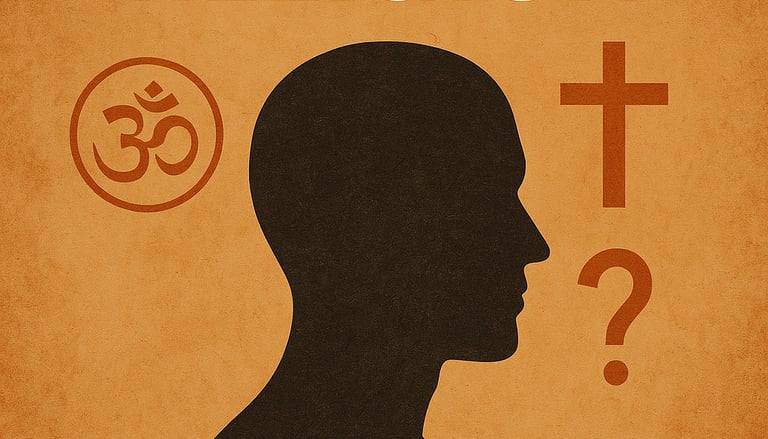A thing about God
A personal reflection on growing up with religion, questioning inherited beliefs, and the philosophical journey that led to rejecting religious dogma in search of truth.
ABOUT LIFE
Sagar
1/1/2025


Growing up, I was always taught about Hindu gods and Buddha. I never questioned what my parents or society told me—I just believed it all, blindly. It wasn't until I began my bachelor's degree in engineering that my mind started noticing contradictions: between the religion I was taught, the beliefs of my friends, and what science explained. Deep down, I always sensed a disconnect, but I had never really stopped to reflect on it.
As I learned more about different religions—reading their scriptures, hearing their doctrines—I began to feel distant from all of them. I started seeing religion as a hypocritical constitution built by a male-dominated society. Perhaps it once served a purpose for early civilizations, but today, it feels defunct.
The more I dove into these worldly religions—their ideas of heaven and hell—the more questions I had. The concept of an all-powerful entity called “God” began to feel delusional. I started listening to debates, talking to people with varying beliefs, and participating in discussions. I questioned myself, my friends, even strangers in colloquies. And eventually, I found my answer: religion does not exist. There!
Let’s take a simple case study—not to convince you, but to nudge your thinking:
Case A:
A is deeply religious. He prays daily, follows every rule dictated by his religion, but discriminates against others based on caste, religion, race, status, and so on.
Case B:
B is an atheist. He doesn't believe in God, but treats everyone equally, respects others, and helps those in need—regardless of caste, creed, religion, or wealth.
Now tell me—who should go to heaven?
If A goes to heaven, then what’s the point of humanity? If someone can secure a place in heaven just by praying, while continuing to harm others, I want no part of that heaven. A heaven where even God disregards ethics? No thanks.
If B goes to heaven because of his good deeds, then what's the purpose of religion in the first place? If we can simply live well, treat others right, and still go to heaven—why follow outdated, superstitious, and often hypocritical religious frameworks? And if B is denied heaven just because he didn’t “believe,” despite his goodness, can you still believe in a god that cruel?
Either way—you’re screwed.
“Is God willing to prevent evil, but not able? Then he is not omnipotent.
Is he able, but not willing? Then he is malevolent.
Is he both able and willing? Then whence cometh evil?
Is he neither able nor willing? Then why call him God?”
Let that sink in.
